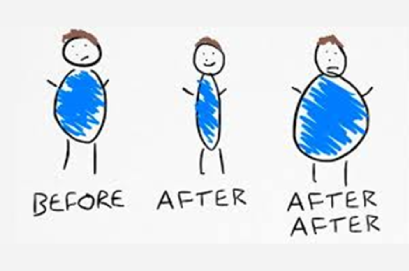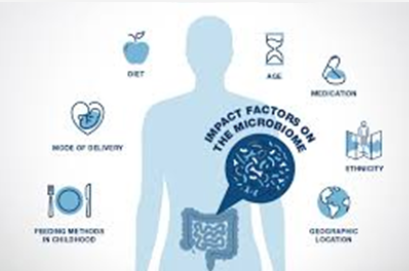
1. What is type 2 diabetes?
Type 2 diabetes is a chronic condition. Characteristic of type 2 diabetes is an elevated blood sugar level. The blood sugar level rises because the body has a relative insulin deficiency, because the insulin is not used effectively. Insulin is a hormone produced by the pancreas and helps transport glucose (sugar) from the blood into the cells of the body, where it is used as energy. In type 2 diabetes, the body cells respond less well to insulin. The receptors become “deaf” to insulin: this is called ‘insulin resistance’.
The Role of Excess Weight in Type 2 Diabetes
Excess weight, especially fat around the abdomen (visceral fat), plays a crucial role in the development of type 2 diabetes. Visceral fat produces hormones and other substances that promote insulin resistance. As insulin resistance increases, the pancreas has to work harder to produce enough insulin, eventually exhausting the insulin-producing cells.
The Benefits of Weight Loss
Weight loss has a significant positive impact on people with type 2 diabetes. Even a modest weight loss of five to ten percent of body weight can lead to:
- Improved blood sugar control; Less body fat can help better regulate blood sugar levels.
- Increased insulin sensitivity; losing weight can reduce insulin resistance, making the body more responsive to insulin.
- Reduced medication; improved blood sugar control can reduce the need for diabetes medications.
- Reduced risk of complications; weight loss can reduce the risk of serious complications such as heart disease, kidney problems and nerve damage.
- Improved energy levels; losing weight can lead to more energy and better overall well-being.

2. Why can it be difficult to lose weight after pregnancy?
There are several reasons why it can be difficult for many women to lose weight after pregnancy, including hormonal changes, lack of sleep, and lifestyle changes.
Pregnancy
There are several reasons why many women find it difficult to lose weight after pregnancy:
- Hormonal changes: During pregnancy, the body undergoes significant hormonal changes, including an increase in estrogen and progesterone. After pregnancy, these hormones can still be out of balance, which can affect metabolism and appetite.
- Lack of sleep: New mothers often experience a lack of sleep due to caring for their baby, which can lead to hormonal changes that can cause cravings for high-calorie foods and make it harder to make healthy choices.
- Lifestyle changes: The arrival of a new baby often brings with it lifestyle changes, including less time for exercise and increased stress. This can make it harder to maintain healthy eating habits.
- Emotional factors: Pregnancy and having a baby can bring on a rollercoaster of emotions. Some women use food as a form of comfort or reward, which can lead to overeating and weight gain.
- Social Pressure: Many women feel social pressure to get back in shape quickly after giving birth, which can lead to crash dieting or unrealistic weight loss expectations, which can ultimately be counterproductive.
Understandably, losing weight after pregnancy takes time and dedication. At OWL center, we understand these challenges and are here to help. We recognize the importance of patience and realistic goal setting, and we are here to support you on your journey to a healthier weight after pregnancy. As a healthcare provider, we offer professional advice and guidance to create a healthy and sustainable weight loss plan. Our team of experts are here to help you develop healthy eating habits, find the right balance of exercise, and address any emotional challenges that may come with the process.

3. What is the yo-yo effect?
The yo-yo effect: a well-known stumbling block for those who have successfully lost weight. It is that frustrating pattern where the kilos seem to return after a diet, sometimes even in larger numbers than before. How does that happen?
Metabolism
The body adapts during a diet, and not always in a favorable way. The metabolism slows down and becomes more efficient at storing energy, in the form of fat. When the diet stops and normal eating is resumed, the body stores the extra calories in preparation for possible future scarcity. Result? Weight gain that is often higher than the starting weight.
In addition, the body has certain set points and will want to return to the old weight. Only when the body can maintain the new weight for a longer period of time will a new balance be created.
Yo-yo effect
At OWL center we understand the battle against the yo-yo effect. That is why we offer an integrated approach that combines losing weight with medication with coaching on healthy behavior. Medication can help regulate the metabolism and reduce food cravings, which will initiate weight loss.
But that is only part of the story. Our coaching focuses on lasting lifestyle changes. We help people develop healthy eating habits, control portion sizes and avoid emotional eating. And of course, we encourage regular exercise and stress management techniques.
This combined approach not only helps people lose weight, but also develop the skills and habits needed to maintain weight loss in the long term. At OWL center, we strive for a sustainable approach to weight management, to beat the yo-yo effect for good.

4. Effectiveness and side effects of tirzepatide
We have received many questions about tirzepatide and would like to provide more information about this new weight loss treatment. Read the answers to some frequently asked questions.
Who is tirzepatide suitable for?
Tirzepatide is an innovative treatment that targets both weight loss and type 2 diabetes mellitus. This means that it can be effective for two different groups of patients:
People who want to lose weight: By combining the gut hormones GIP and GLP-1, tirzepatide promotes both satiety and improved fat metabolism. Studies show that this can lead to more weight loss compared to other treatments such as semaglutide.
People with Type 2 Diabetes: Tirzepatide helps regulate blood sugar levels by increasing insulin production and improving insulin sensitivity. This makes it a valuable option for the treatment of type 2 diabetes.
How GIP and GLP-1 work
GLP-1 and GIP are gut hormones that are released after eating. GLP-1 slows stomach emptying and sends signals of fullness to the brain, while also increasing insulin production. GIP, on the other hand, mainly affects fat metabolism and increases insulin sensitivity. The combination of these hormones ensures that people eat less and lose weight faster due to improved fat metabolism.
Feeling of satiety
The feeling of satiety of tirzepatide, compared to semaglutide, has not been directly investigated in studies. However, from a pharmacological perspective, people lose more weight with tirzepatide. This is partly due to the activation of the intestinal hormone GIP, which plays a role in fat metabolism, while GLP-1, another intestinal hormone, mainly ensures a feeling of fullness due to delayed gastric emptying and signaling to the brain.
Side effects
A frequently asked question is whether the side effects of tirzepatide are more severe than those of semaglutide. Although the direct comparison for weight loss is still ongoing, the study in type 2 diabetes shows that the side effects of tirzepatide are comparable to those of semaglutide. Side effects are more common at higher doses, but are transient.
The combination of GIP and GLP-1 offers unique benefits that extend beyond those of GLP-1 agonists such as semaglutide alone. With ongoing studies and continued evaluations, tirzepatide promises to become an important player in the treatment of obesity and diabetes.
We hope that this information answers your questions. Feel free to contact us for more information or make an appointment for an intake.

5. This is your microbiome and this is how you optimize it
A microbiome: everyone has one. It is a collective name for all microorganisms in our body, such as bacteria, viruses and fungi. The microbiome is a complex ecosystem and it plays an important role in controlling your weight and promoting your health.
It supports your immune system and helps with digestion. So it’s important to optimize your microbiome. But how do you do that? Here are some practical tips:
1. Feed your body with fiber-rich foods
Enrich your diet with fiber-rich foods, such as crunchy vegetables, juicy fruits and whole grains. These are real fiber bombs! These fiber-rich foods give you a long-lasting feeling of fullness and they feed the good bacteria in your intestines, which improves your digestion.
2. Get probiotics from your diet
Give your intestines a boost with probiotics. These are living microorganisms that are beneficial for your digestive system. Probiotics are found in fermented treats such as yogurt, kefir, sauerkraut and kimchi.
3. Feed your intestines with prebiotics
Prebiotics are substances that we cannot digest, but that are good for the microorganisms in your intestines. Your intestines use prebiotics as food. Garlic, onion and whole grains are rich in prebiotics and are therefore an excellent fuel for your gut.
4. Moderate antibiotics
Sometimes antibiotics are really necessary and you can’t avoid them. Unfortunately, they can have a negative impact on your microbiome and weight management. Therefore, try to limit them and only use antibiotics when necessary.
5. Prevent and relieve stress
Long-term stress can cause weight gain and disruptions in your microbiome. Therefore, look for ways to prevent or reduce stress. Tips from us: try meditating, take a regular yoga class or do relaxation techniques. This is not only good for your body, but also for your mind.
6. Keep moving
It is common knowledge that sufficient exercise contributes to achieving and maintaining a healthy weight. But did you know that it also promotes the diversity and activity of your intestinal bacteria? This improves your digestion and keeps your weight under control.
Hopefully you can get started with these tips! Do you have any questions, or could you use some support? Please feel free to contact us. We are here to help you on your way to a healthy lifestyle.

6. Changes during menopause
Hormones go in all directions during menopause. Sound familiar? Then you probably notice quite a few changes in your body. Weight management, for example, can be quite a challenge during this phase.
This has several causes:
Less production of estrogen and progesterone
During menopause, your body changes. This is mainly because the female sex hormones estrogen and progesterone change. These hormones are produced in much smaller quantities in the body during and after menopause.
Effect on metabolism
These female hormones have a protective effect on metabolism. After menopause, we see that the body is more inclined to convert energy into fat. Where the female hormones used to ensure that fat was mainly stored around the chest and buttocks, they now ensure that fat accumulates more around the abdomen. And unfortunately: this fat is stubborn.
Muscle mass
Muscle mass also does not remain unchanged due to hormone differences. After menopause, muscle mass is less well preserved. Do you want to maintain your muscle mass? Then do strength-building exercises regularly.
Sweet cravings
Sugars, fast carbohydrates and alcohol in particular can disrupt blood sugar levels more during and after menopause. ‘Sweet cravings’, or craving for sweets, are a consequence of this. In addition, hot flashes are also a consequence of the disruption in blood sugar levels.
Effect on sleep
Sleep is very important. For your health, state of mind and for your weight loss process. During your sleep, your body recovers and your metabolism gets going. Unfortunately, menopause can also affect the quality of your sleep.
Losing weight can be very difficult during and after menopause. At OWL center, we understand your challenge all too well! But the good news is that it is certainly not impossible. We are here to help. With our expert treatments, including medication that mimics GLP-1, and coaching on healthy behavior, we will guide you through this phase to a healthier and more balanced life. Contact us today and take the first step towards better well-being.

7. Proteins are essential
Proteins are important for everyone. They are essential in a healthy diet, so also if you want to lose weight. Do you want to lose a few kilos? Then it is important to get enough proteins
In this article you can read all about the benefits of proteins, which products are best to eat and how much protein your body needs.
Feeling full for longer
Feeling full for a long time after a meal – that’s what we all want. Proteins are very satiating and give you a long-lasting feeling of fullness after a meal. This helps to control your appetite and reduces the risk of overeating and snacking. Do you also sometimes experience a dip after a meal or snack? We also call that a ‘sugar crash’. A meal with sufficient proteins reduces that well-known sugar peak and dip. A great tool if you want to learn to deal better with your hunger feelings.
Muscle retention during weight loss
If you eat fewer calories, there is a risk of muscle loss. And that muscle mass is so important. Sufficient muscle mass helps to maintain the metabolism and support weight loss. Do you want to maintain or build your muscle mass? Then two aspects are very important: consuming sufficient proteins and regular (strength) training. Are you scared of the latter? Don’t be! You don’t have to sweat it out in the gym every day. For example, start with a few squats, or go for a walk with a backpack filled with weights. These are already great tips to minimize muscle loss while losing weight.
Fun fact: this is how your energy consumption works
Proteins can increase your body’s energy consumption. This is how it works: digesting proteins costs more energy than processing carbohydrates or fats. The result? Increased calorie consumption and fat loss. A nice extra boost in your battle against the pounds!
Getting started with proteins
So proteins offer enough benefits for your body, we now know that. But which foods are good sources of protein? First of all, animal products contain a lot of proteins. Meat, fish, poultry, dairy products and eggs are good sources of protein. Fortunately, there are also enough options for people with a vegetarian or vegan lifestyle. Soy, legumes and nuts all contain a lot of proteins. Do you eat plant-based? Then make sure to vary between different protein sources, so that you get all types of proteins.
Adding proteins to your eating habits
Perhaps the most important thing: adding proteins to your eating patterns. How do you do that? We give you tips:
-
Tip 1: enrich your meals with meat
Of course, chicken fillet is number one when it comes to protein content. With no less than 31 grams of protein per 100 grams, this is an excellent addition. For variety, you can also choose turkey fillet, beef steak, pork tenderloin or lamb.
-
Tip 2: eat fish regularly
Salmon, tuna or mackerel are rich in proteins and healthy fats.
-
Tip 3: dairy is sometimes an option
Looking for a protein-rich breakfast or snack? Dairy is sometimes an option! Choose (low-fat) quark or Greek yoghurt. Dairy is not always good for everybody. Discuss it with your dietitian if you have any doubts.
-
Tip 4: experiment with plant-based protein sources
Tofu, tempeh, beans, lentils, nuts and seeds are all excellent plant-based protein sources. Experiment with these and opt for a varied diet.
Getting enough proteins is therefore very important; whether you are going for weight maintenance or weight loss. Therefore, choose protein-rich foods and do regular (strength) training. That is a great basis for a healthy lifestyle!

8. Losing weight with GLP-1: this is how it works
One of the options when you start treatment with us is treatment with the lancing device. How exactly does this drug work? We will tell you in this article.
The injection pens that you will be prescribed if we opt for this treatment contain Glucagon-like peptide 1. The abbreviation of Glucagon-like peptide 1 is GLP-1 and because that term is better known and shorter, we will call it that in this article.
GLP-1 and obesity
GLP-1 is a substance that is also released in our intestines when we eat. This substance gives the signal: “Stop eating, you’ve had enough”. By injecting this substance, you help your body to lose weight. The release of insulin is stimulated, the release of glucagon is inhibited and the emptying of the stomach is delayed. This gives you that feeling of being full much faster. You are also full for longer and you experience less hunger. It is very suitable for people who experience little inhibition in eating, eat larger portions and quickly feel hungry again after eating. What you notice is that your appetite decreases and that you are full much faster and for longer.
GLP-1 weight loss
Is it really that easy? GLP-1 injections and weight loss? No. Doctor Inge Palm previously explained in a blog about this topic that it is mainly about changing your lifestyle. Medication to lose weight will help you during this process, but without changing your lifestyle you will not get there. You can see the GLP-1 medication as a nice support. Good to know; at OWL center, obesity medication is only offered in combination with a lifestyle program and prescribed by a doctor.
GLP-1 treatment
If you choose GLP-1 treatment with us, you might like to know what such a treatment will look like. At the OWL center, we will talk to each other during an intake to discuss your situation and wishes. We will then see whether the treatment with a lancing device suits you: it must be medically safe with your health and history and it must match your points of attention and wishes. If this is the case, we will tell you everything about the possible side effects and you will receive a prescription. We will then get to work together. As we said before, lifestyle changes are the most important thing if you want to lose weight. To achieve this, your coach is there to support you as a stick behind the door. Are things not going well for a while? Then the coach is there to think along with you and give you advice.
Conclusion
The lancing device is therefore a great way to support you in your weight loss process. Never do it alone and only start when you have the right guidance and a good plan. Then the chance of success is greatest.
Contact
You can always contact our employees. We are ready to answer any questions you may have. We are available by phone from Monday to Friday from 8:30 to 18:00.


